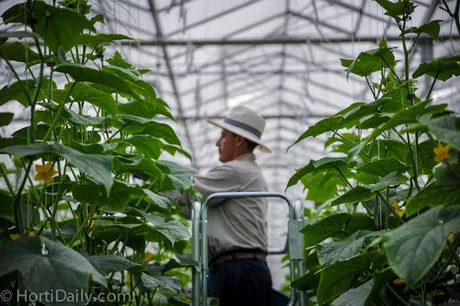Will UK greenhouse growers become early adopters of innovations like the deleafing robot or the automatic cucumber harvester? As a result of Brexit, the growers are facing huge labour shortages and the situation is not looking to be solved within the next few months.
A large part of the British glasshouse industry has arrived at its peak season again. It greatly depends on European workforces from countries like Romania and Poland in order to pick tons of cucumbers, tomatoes and bell peppers in time. This year however, growers are running into trouble, simply because there is a lack of applicants to do the job.
"We used to see thousands of applications normally, but since Brexit that has turned into a minimum", explained Lee Stiles of the Lea Valley Growers Association. "There is a sharp drop in the amount of European workers who want to work here. Next to this we experience a drop in local workforces too, due to pretty much full employment."
Stiles explained that this has the industry worried and that several lobbying parties are doing their utmost to raise the urgency of the matter with officials. "We rely on the free movement of labour and are asking for the government to set up a seasonable working scheme."
It remains the question if a free working scheme will solve the issue. Countries like Poland and Romania, the two major contributors of workers to UK horticulture, also experience full employment as a result of bursting economies and the end of the recession. With increasing domestic wages and job opportunities, workers are less likely to leave their country. The weakness of the British pound worsens the situation even more.
According to Stiles, UK growers and packhouses are eager to make their business even more efficient. "Efficiency has always been a major concern for growers, and a lot of them are generously interested in automating as far as they can. This is possible for packing processes, but harvesting of perishables will always require human labour. That is what makes growers worry."
In the Lea Valley, Stiles' working area, the greenhouse acreage sees a 10% expansion every year. Due to the proximity to London, growers have less trouble to attract a sustainable workforce. Nonetheless, Stiles expects that with the projected increasing demand for British produce, the industry has to come up with some creative solutions.
Not only in terms of labour issues, but also in regards to plant protection products. Stiles explained that since Brexit, UK growers are unable to use the same or as many as European producers. This is a big issue and they are lobbying with the government to speed up new regulations that will restore their regulatory framework as soon as possible.



